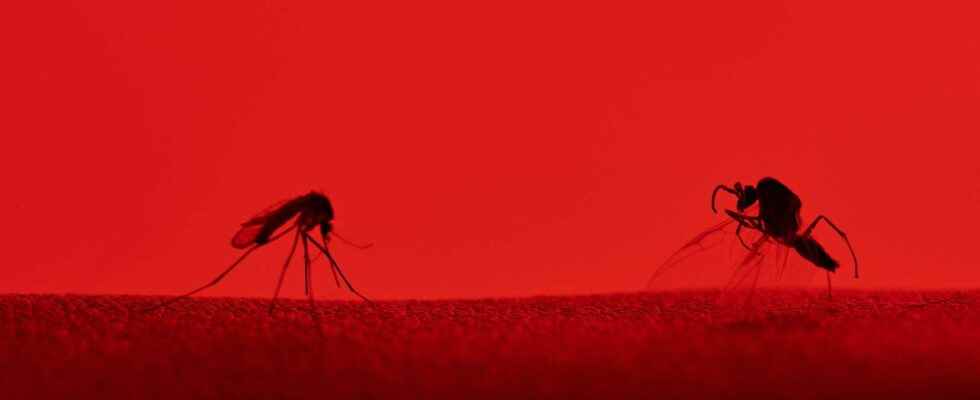Several stimuli guide mosquitoes to our skin during the summer. Three were already known to scientists: CO2 exhaling, body temperature and perspiration. Scientists at the University of Washington have just discovered a fourth, color!
Every summer, there are those who are devoured by mosquitoes and those who survive. For scientists, there are three main reasons for this apparent injustice. ” I used to say that there are three major signals that attract mosquitoes: your breathing, your sweat and your skin temperature. In this study, we identified a fourth signal », explains Jeffrey A. Riffelprofessor of biology at the University of Washington.
Mosquito bites not only cause itchy pimples, they are also a source of disease. The experiments were carried out on Aedes aegyptia species mosquito vector of dengue fever, Zikafrom chikungunya and yellow fever. Infectious diseases that wreak havoc in tropical countries. These diseases are also transmitted by tiger mosquito (Aedes albopictus) Who is present almost everywhere in metropolitan France and overseas.
Mosquitoes prefer red
In their experiments, Jeffrey A. Riffel and his colleagues followed the flight path of one million female mosquitoes, the only ones that sting to feed their eggs, in a controlled environment. This is a two meter long test chamber where theinsect has the choice between two colored targets. The scientists followed the trajectory of the insect thanks to sixteen cameras and a system of tracking 3D. It all starts with a jet of CO2a gas odorless for humans but very appetizing for mosquitoes. Then, thanks to the camera system, the scientists were able to observe which colored target the insects headed for first. They seem to prefer red, orange and black while white, green and purple leave them indifferent.
So for mosquitoes, the color red would be the promise of a good blood meal. ” The red color is not only present on your clothes, it is also on the skin. Skin color doesn’t matter, we all emit a strong red signature. Filtering out these attractive colors on our skin or avoiding wearing clothes of these colors could be another way to prevention mosquito bites “, continues Professor Riffel.
This preference for red is inscribed in the mosquito’s genes. Insects mutated by several genes became indifferent to red-orange stimuli. This also suggests that the observations made here are valid only for the species Aedes aegypti and that other mosquitoes might prefer other wavelengths. In conclusion, when a mosquito seeks food, it is first attracted by the smell, before visually locating its favorite restaurant.
Mosquitoes also have favorite colors!
Article published on July 28, 2020 by Nathalie Mayer
Mosquitoes are among the main vectors of diseases affecting both humans and animals. And researchers have just made a discovery that could help better control this scourge. According to their work, mosquitoes are attracted — or repelled — by different colors depending on their species and the time of day.
“Conventional wisdom suggests that mosquitoes are attracted to ultraviolet light (UV), and this, in a non-specific way”says Todd C. Holmes, professor at the University of California at Irvine (United States) in a communicated. Hence the widespread use of UV lamps to combat this scourge. “But our results show that things are much more complicated than that. »
The researchers studied the susceptibility of different species of mosquitoes to different types of light. From Aedes aegyptithe mosquitoes of the yellow feverwhich bite mainly during the day, and Anopheles coluzzi, vectors of malaria, which mainly bite at night. They found that the susceptibility of mosquitoes depends on their sex, species, time of day and color of light.
Fight more effectively against mosquitoes
For example, daytime biting mosquitoes, especially females that need it for their fertilized eggs, are attracted to light during the day, regardless of its color. On the other hand, biting mosquitoes nocturnal specifically avoid ultraviolet (UV) and the blue light during the day.
“By gaining an understanding of how mosquitoes react to light in a species-specific way, we can develop new environmentally friendly alternatives to more effectively control insect pests. — in general — and reduce the need for toxic pesticides harmful to the environment»concludes Todd C. Holmes.
Interested in what you just read?
